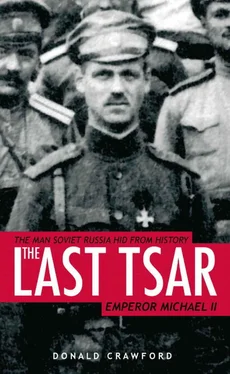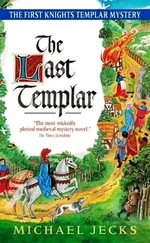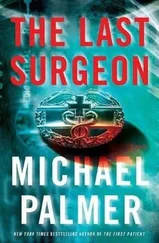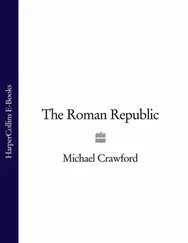Michael, as the town’s own Grand Duke, was rarely the subject of critical gossip and woe betide anyone from the capital who thought of doing so in earshot of any resident of Gatchina. He was popular, greatly admired, and the Grand Duke whom the town was proud to think of as its own. He was never accompanied by guards or officials or courtiers and he never exhibited any signs of rank. Walking openly through the streets he would stop and cheerfully chat to the locals, patting their children, and often quietly helping those in need — though sometimes he was known to be too trusting for his own good, giving aid where none was deserved.
This approval of Grand Duke Michael Aleksandrovich was echoed well beyond the narrow world of Gatchina itself. His brother-in-law Sandro wrote of him that ‘he fascinated everybody by the wholehearted simplicity of his manner. A favourite with his family, with his fellow officers, and with all his countless friends, he possessed a well-organised mind and would have succeeded in any branch of the service.’ 8
His cousin and close friend, Prince Nicholas of Greece, observed that ‘he was a very keen soldier and a real sportsman; his jovial nature endeared him to all. He was a fine, athletic young man, and went in for physical training, which he practised like a professional gymnast’. 9
Yet there was much more to him than that. He spoke French and English fluently and was a competent musician on piano, flute, balalaika and guitar, composing several of his own pieces. He enjoyed the theatre, ballet and opera, and was widely-read. In one letter he listed the books he was then reading; they included A History of the French Revolution , a biography of Robespierre, Dostoevsky’s Crime and Punishment, as well as a couple of other literary novels.
Polovtsov, a member of the state Council, and head of the Imperial Russian Historical Society, which had published several of Michael’s academic papers on the Napoleonic War, 10judged that Michael ‘has an extraordinary strong will and once he has taken an aim in his sights he will achieve it without haste, and with undeviating firmness.’ 11
Sergei Witte, who had been Alexander III’s chief advisor and who twelve years later became Russia’s first prime minister after the convulsions of the 1905 Revolution forced Nicholas to agree to the formation of an elected Duma, or parliament, was another who spoke highly of Michael. He had taught him political science and economics, 12and he had long made little secret of his view that Michael was to be preferred to Nicholas. One senior courtier observed that Witte ‘never tired of praising his straightforwardness.’ 13Grand Duke Konstantin Konstantinovich wrote that ‘Witte sees in him a clear mind, an unshakeable conviction in his opinions, and a crystalline moral purity.’ 14
Dr E. J. Dillon, the widely-respected correspondent of the London Daily Telegraph , quoted Witte as saying that ‘if Alexander III had lived, or if his son Michael had succeeded him or were yet to come to the throne, much might be changed for the better, and Russia’s international position strengthened.’ 15
Comments such as this were taken seriously at the time, for in 1899 Michael’s elder brother George had been found dying beside his overturned motorcycle near his home in the Caucasus, and with that Michael, still only twenty, had become heir to the throne, for although Nicholas had daughters he had as yet no son to succeed him.
In eighteenth-century Russia there had been empresses reigning in their own right — the widow of Peter the Great, his daughter Elizabeth, and Catherine the Great — but after Paul I succeeded his mother, whom he hated, he ruled that henceforth no woman was eligible to take the crown; that law had been accepted as binding ever since.
Six weeks before Michael found himself heir, Alexandra had been delivered of her third child, Marie, and after that it was noticed that Nicholas ‘set off on a long solitary walk’, although when he came back he seemed as ‘outwardly unruffled as ever.’ 16Obsessed with her need to produce a male heir, Alexandra quickly became pregnant again in the autumn of 1900, though it seemed that it might be too late, for Nicholas had fallen gravely ill on holiday in the Crimea and there were fears that he might die. He had intestinal typhus, a disease which in those days often proved fatal. In that event, Michael would automatically succeed his brother as Emperor.
Alexandra refused to accept that, insisting to gathering ministers that even if Nicholas died, the posthumously-born child, if a boy, should be declared Tsar and that in the meantime she should rule Russia as Regent on behalf of her womb. The ailing Nicholas ‘sided with his wife’. Court minister Baron Fredericks reported that Nicholas thought Michael ‘will get everything into a mess — he is so easily imposed upon.’ 17Witte strongly disagreed. At an impromptu conference of ministers in a Yalta hotel he ‘succeeded in winning over to my side all the members of the improvised conference. It was decided that in the event of the Emperor’s death we should immediately take an oath of allegiance to Michael Aleksandrovich.’ 18
Witte, dismissed as prime minister in 1906, dated his becoming ‘the object of Alexandra’s particular enmity’ from his stand at Yalta, which she interpreted as ‘an underhand intrigue on my part against her.’ 19As it happened, it was all for nothing anyway: the Tsar recovered and when Alexandra did give birth to her fourth child, it was another girl, Anastasia. It would not be for another four years — in August 1904 — that Alexandra finally and triumphantly produced the long-awaited son and heir, named Alexis. Tragically, he would be found to be suffering from the ‘bleeding disease’ haemophilia, with any bump or bruise a threat to his life.
Six months earlier, in Germany, her sister Irene, married to the Kaiser’s brother Prince Henry, had lost her own haemophilic son to the ‘terrible illness of the English family’; years earlier, Alexandra’s own little brother had also died after he fell and bumped his head in Darmstadt. The threat was clear and terrible: Alexis’s chances of surviving childhood, or even living long into manhood, were not great.
However, that Alexis was so inflicted was not immediately apparent and in the manifesto produced on his birth Nicholas declared that in the event of his own death before Alexis was old enough to reign in his own right — 1920 — Michael was appointed Regent. Characteristically, Alexandra succeeded in adding her name as co-Regent, meaning that she and Michael would rule in tandem. With that, Michael had especial reason to pray for his brother’s well-being.
GIVEN that the life of the infant Tsarevich was at constant risk, there were very good reasons why Michael’s mother the Dowager Empress should be anxious that he married the right woman. The immediate imperial family relied upon him to be able to step in, should anything terrible happen, as it could do in those dangerous times. He was the insurance policy for the throne of his father.
There were plenty of other Grand Dukes in the line of succession, to be sure, as descendants of Alexander II or his predecessor Nicholas I, but the Dowager Empress was chiefly interested in keeping the crown in the hands of her late husband’s direct descendants, not passing elsewhere. In her mind, Michael properly married was the best hope of ensuring that future. Moreover, when she looked at the other Romanovs, there were none with the qualities she saw in her son Michael.
The family which ranked immediately behind him was headed by her brother-in-law Vladimir, who for his own reasons had always thought that he would have proved a better Tsar than his elder brother Alexander, though no one else outside his own circle shared his conviction. He had been briefly banished by Alexander after a disgraceful scene in a St Petersburg restaurant, in which he drunkenly tried to throttle a French actor whom he thought had made a pass at his wife 20, but in 1908, aged sixty-one, he was the senior Grand Duke after Michael, and stood third-in-line to the throne.
Читать дальше












